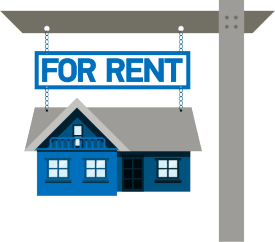10 Tips For Investing In Rental Property

Real Estate has produced many of the world’s wealthy people, so there are PLENTY of reasons to think that property is a sound investment. But like any investment, it’s better to be well-versed before diving in with hundreds of thousands of dollars. Arm yourself with the information below before starting a new career as a real estate tycoon in the Lake Martin Area.
1. MAKE SURE IT’S YOU
a.
Do you know your way around a toolbox? How are
you at repairing drywall? Or unclogging a toilet? Sure, you could call somebody
to do it for you, but that will eat into your profits. Property owners who have
one or two homes often do their own repairs to save money. If you’re not the
handy type and you don’t have lots of spare cash, being a landlord may not be
right for you. Your first property will consume a lot of your time as you learn
the ins and outs of being a landlord. Think of it as another part-time job. Do
you have time?
2.
PAY DOWN DEBT FIRST
a.
Savvy investors might carry debt as part of
their investment portfolio, but the average person should avoid debt. If you
have student loans, unpaid medical bills or have children who will soon attend
college, purchasing a rental property may not be the right move at this time.
3.
GET THE DOWN PAYMENT
a.
Investment properties generally require a larger
down payment than owner-occupied properties, so they have more stringent
approval requirements. The 3 percent you put down on the home you currently
live in isn’t going to work for an investment property. You will need at least
20 percent, given that mortgage insurance isn’t available on rental properties.
4.
BEWARE OF HIGHER INTEREST RATES
a.
The cost of borrowing money might be cheap right
now, but the interest rate on an investment property will be higher than
traditional mortgage interest rates. Remember, you need a mortgage payment
that’s low enough so that it won’t eat into your monthly profits too
significantly.
5.
CALCULATE YOUR MARGINS
a.
Wall Street firms that buy distressed properties
aim for 5 percent to 7 percent returns because they have to pay a staff.
Individuals should set a goal of 10 percent. Estimate maintenance costs at 1
percent of the property value annually. Other costs include insurance, possible
HOA fees, property taxes and monthly expenses such as pest control and
landscaping.
6.
DON’T BUY A FIXER-UPPER
a.
It’s tempting to look for the house that you can
get at a bargain and flip it into a rental property. But if this is your first
property, that’s probably a bad idea. Unless you have a contractor, who does
quality work on the cheap – or you’re skilled at large-scale home improvements
– you’re likely to pay too much to renovate. Instead, look to buy a home that
is priced below the market and that needs mostly minor repairs.
7.
CALCULATE OPERATING EXPENSES
a.
Overall, operating expenses on your new property
will be between 35 percent and 80 percent of your gross operating income. If
you charge $1,500 for rent and your expenses come in at $600 per month, you’re
at 40 percent. For an even easier calculation, use the 50 percent rule. If the rent
charge is $2,000 per month, expect to pay $1,000 in total expenses.
8.
DETERMINE YOUR RETURN
a.
For every dollar you invest, what is your return
on that dollar? Stocks may offer 7.5 percent cash-on-cash return while bonds
may pay 4.5 percent. A 6 percent return in your first year as a landlord is
considered healthy, especially given that number should rise over time.
9.
GET A LOW-COST HOME
a.
The more expensive the home, the higher your
ongoing expenses will be. Some experts recommend starting with a $150,000 home.
10.
FIND THE RIGHT LOCATION
a.
Look for low property taxes, a decent school
district, a neighborhood with low crime rates, and area with a growing job
market and plenty of amenities like parks, malls, restaurants and movie
theaters.
THE BOTTOM LINE
Keep your expectations realistic. Like any investment, a
rental property isn’t going to produce a large monthly paycheck for a while and
picking the wrong property could be a catastrophic mistake. Consider working
with an experienced partner on your first Lake Martin property or rent out your own home to
test your landlord abilities.
I'm not sure if you know this but.......
Lake Martin is a great place to own vacation rentals as well. Here's some potential properties with access to



Comments
Post a Comment